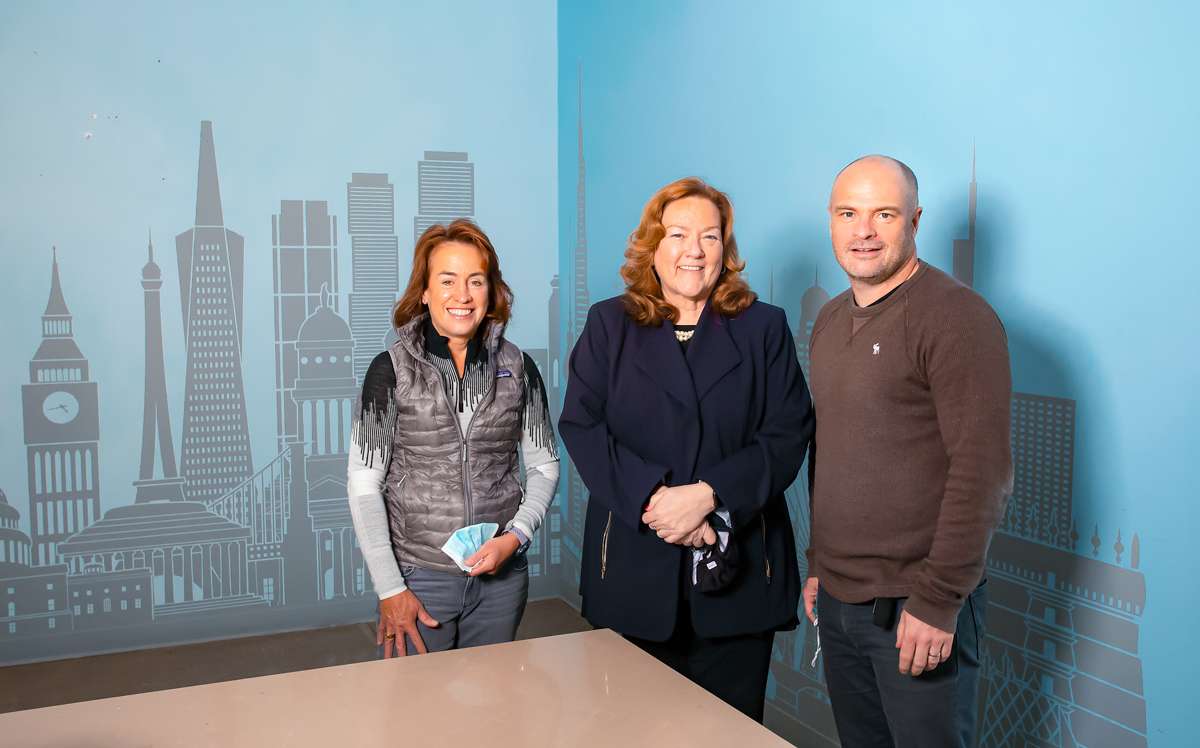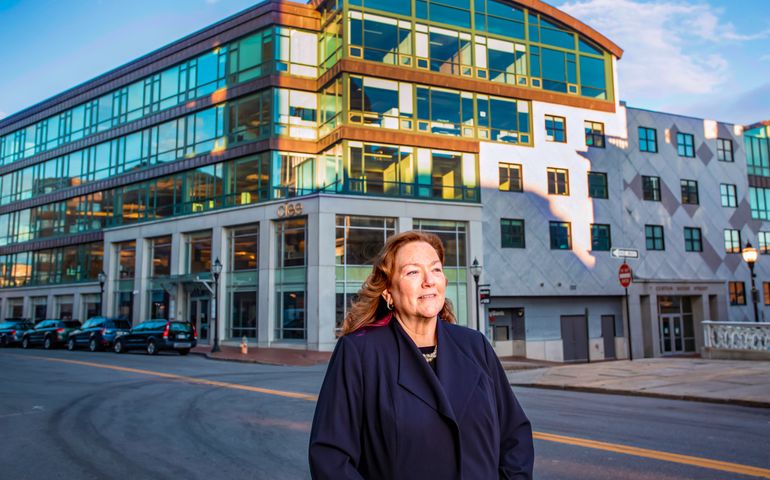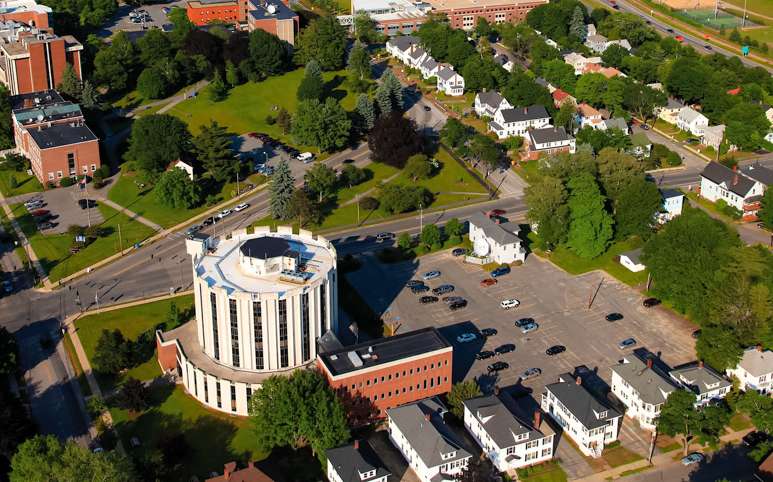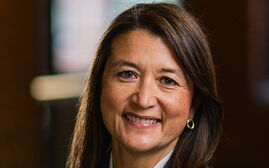
Future-proofing Maine Law: Leigh Saufley reflects on school's move, diversity and more
 Photo / Tim Greenway
Leigh Saufley served as chief justice of the Maine Supreme Judicial Court for close to two decades before taking the helm as Maine Law dean last year. The law school is in the process of moving to 300 Fore St. in downtown Portland, shown here.
Photo / Tim Greenway
Leigh Saufley served as chief justice of the Maine Supreme Judicial Court for close to two decades before taking the helm as Maine Law dean last year. The law school is in the process of moving to 300 Fore St. in downtown Portland, shown here.
When Leigh Saufley spoke to Mainebiz last year in her first week as dean of the University of Maine School of Law, she talked about the “surreal” experience of being in an empty building. Eighteen months later, we sat down with Maine’s former chief justice again over Zoom to find out about this year’s incoming class, new academic programs, and what the move to downtown Portland will mean for the state’s only law school.
Mainebiz: What can you tell us about this year’s first-year law students?
Leigh Saufley: It is an extraordinary and wonderful group of students, and I would say that I probably believe that about every class that I have met. This particular class has really strong credentials, so you will see us bragging about the fact that they’re coming in with higher LSAT scores, but the most important characteristic of this class is that they are intensely engaged — so they’re in the building, masks are mandatory and our vaccination rate is somewhere around 97%. They’re all taking care of each other, they’re making sure they’re not bringing the virus into the law school, and they’re very patient with us.
For the first two months of their school year, we couldn’t let them eat inside the building. They were lovely and patient. We got a tent, they ate at round tables out on the lawn and fought off the hornets and the aggressive squirrels, but they were lovely about it, and we’ve now found places where they can sit far enough apart, so that they can eat inside in the colder weather (but they can’t all do it at once because the building isn’t big enough). And they are very much involved with student groups, with a lot of what goes on in a law school that connects students to issues of justice in their world.
MB: What else can you share about the make-up of the class?
LS: When I graduated from Maine Law in 1980, my class was the first class in which there were the same number of women as men. This class, the class of 2024, is close to 65% women.
MB: Why do you think that is?
LS: We don’t know. Women are very interested in issues of justice, and the men in the class are of course absolutely wonderful, but there’s just this first-time distinction, and yet they all seem very much involved with each other. One of the things we’re very pleased about, we have made a very serious effort to increase diversity at Maine Law, in a state that has come to diversity much later than other states.
Typically, the [law school’s] diversity rate runs somewhere between 8% and 12% of the class; this year, we hit close to 18% diversity, which is just wonderful. It livens up the class, and there are some wonderful students from all walks of life.
MB: What about bringing more diversity to the faculty as well?
LS: We’re only now starting to rebuild the faculty, so we’re working seriously on diversity for faculty and for staff, and as we hire that’s going to be one of our strongest focuses.
MB: To what extent do you think you’ll benefit from the so-called Great Resignation, and more people considering going into law?
LS: I think that’s entirely possible, and certainly we saw in our student applications this year, the number of applications were up about 35%. With regard to graduate school, people make decisions at that point about what is most important to them, and to many of these students what’s most important is to make sure the world is just and fair, and that they are able to have a voice in making it a good world.
MB: What can you share about Maine Law’s planned move to downtown Portland?
LS: We have a five-year lease with an option for another five years, and the possibility of purchasing the building eventually, so there is a real potential that we could be in the building for 10 or even longer. It’s at 300 Fore St. right beside the Custom House, two blocks from the federal and state courts, one block away from the blue economy — the building could not be in a better place for our students to be connected. It’s got five floors of wonderful, light, beautiful space and 64,000 square feet.
When we get in depends so much on what’s going on with the supply chain and with subcontractors, and it’s unfortunately a bit unpredictable. We had originally hoped to get in early in the next semester, maybe later in the next semester. It all depends on some of those forces outside of our control.
MB: In terms of the educational aspect, Maine Law will share space with the University of Maine graduate and business schools?
LS: The MBA program will be co-housed with us, and of course the Graduate and Professional Center and the CEO of Maine Center Ventures. We’re already benefiting from this building [at 300 Fore St.], and we are meeting there. The opportunity to meet and talk about cross-disciplinary education, expanding the work between the business and the law school, getting the Muskie [School of Public Service] policy folks involved with us much more often, it’s really exciting.

MB: What can you tell us about some of your new academic programs?
LS: We have just set up the new business and transactional program, which is a wonderful addition to the collaboration that’s going on between the MBA and the law school. There is a course happening this very fall that’s all about business startups and entrepreneurial work, and that course is being taught by a professor from Maine Law and a professor from the MBA, and students are really getting involved in this business/law collaboration, which is very exciting, and that will be a part of what this certificate supports.
In addition, we have just obtained the authority through the board of trustees to create an MLS, a Master of Legal Studies. This would be a 30-credit degree program that would be primarily online, and be available for people in business, people in management and executive positions, and it will allow them to get a much greater understanding of how the law works in their particular area and learn about all of the issues around privacy law and some of the new issues coming up there.
We’ve completed the first step of the MLS, and the next step is bringing on board the folks who will create the program, make sure it’s high quality, and then get it out there to the students. We’re also looking at an expansion of our legal clinic into Aroostook County.
MB: Did the pandemic have an impact on the clinic’s ability to take cases?
LS: They [the students] didn’t miss a step. They were representing people through Zoom hearings or, in some instances, in courthouses fully masked and space-compliant. They continued to represent people throughout the pandemic, and they just did a terrific job.
MB: To what extent has the pandemic changed legal education?
LS: We know that there are ways to teach at a distance that are more engaging and assure really deep learning, and most of those ways also include some in-person work. We also know that the first year of law school is not particularly amenable to distance learning, but we’re hoping that 2L and 3L students — who are very often off doing externships — can then take classes online as we move forward.
What we learned that was most important — other than just making sure that there’s a really strong connection so the learning occurs — is that the technology matters. Going into the new building, we’re working very carefully to make sure that we’ve got the right technology for any of the classes that are going to be taught online.
MB: What progress has Maine Law made so far on diversity, equity and inclusion?
LS: I’m delighted with the progress so far. We’ve had multiple forums, we are connecting with people throughout the world, and the students put on the first Human Library in the state of Maine [part of a global nonprofit learning initiative that hosts conversational events designed to challenge social stigma and stereotypes]. They are so creative and so caring about making all of this work.
MB: Finally, after a year and half as dean, what grade do you give yourself?
LS: I give myself great credit for actually being right here at the desk and, rather than grade myself, let me just tell you that it was one of the best decisions I ever made. I absolutely love the job. Whether I’m doing it well, we will see in the next several years, it’s really a little too early to tell whether what I’m doing is actually going to work. But I can just tell you, the faculty, the staff, the students, everybody’s amazing, and I’m just so glad I made the decision.

Mainebiz web partners
This is simply a fabulous move by Saufley. She is a dynamo and her enthusiasm is contagious. I love that they will be downtown!














1 Comments